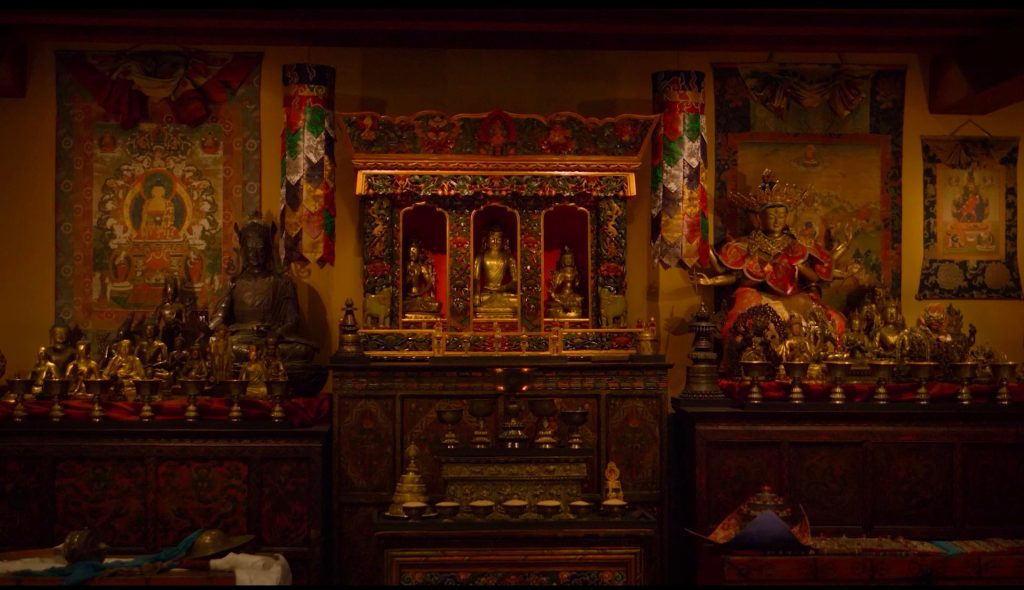Nothing is permanent, so everything is precious. Here’s a selection of some happenings—fleeting or otherwise—in the Buddhist world this week.
“It’s been a while since there were more monkeys than humans.”
COVID-19 is causing financial difficulty for people in Japan’s Kanto and Kansai regions, where their economies heavily rely on tourism, driven in part by the areas’ historic Buddhist temples and Shinto shrines. For the past five years tourism has led to overcrowding and price gouging, but now some rooms in upscale hotels in Kyoto are as cheap as the local youth hostels, reports the Japan Times. To try to encourage visitors, CNN reports, merchants in Kyoto’s Arashiyama district created a campaign promoting the empty, usually overcrowded tourist sites, hanging signs that translate to phrases such as: “There are few people around in Arashiyama” and “It’s been a while since there were more monkeys than humans.”
Kyoto’s peak tourism season occurs from February to early April, when foreign and domestic tourists flock to see the world-famous cherry blossoms. This year, however, traditional cherry-blossom events have been canceled, museums have closed, and many have avoided traveling due to the risk it poses during a pandemic. The emptiness, though, is partly a result of China’s outward-travel ban and as well as another ban that Japan has put on travelers who hold passports from certain areas of China. Approximately one third of Japan’s tourists come from China.
Tibetan Buddhist Shrine Room Goes Virtual
The Tibetan Buddhist Shrine Room at the Rubin Museum of Art in New York City is now accessible for a virtual visit. The Himalayan art museum, which closed last week due to concerns regarding the rapidly spreading coronavirus (COVID-19), released a two-hour stream of the Shrine Room, featuring the sounds of Tibetan throat-chanting and flickering butter lamps that are part of the live installation. The Rubin hopes that by making this footage available to all during this period of social distancing, the Shrine Room “can continue to be a refuge in times of stress, anxiety, and uncertainty.” The museum also offers an interactive version of the shrine on their website, and an audio tour with the Rubin’s curator.
World’s Biggest Water Fights Canceled
The world’s biggest water fights, which typically take place in Southeast Asian countries during mid-April Buddhist New Year celebrations, have been canceled due to the coronavirus pandemic, Reuters reported. Myanmar, where Burmese Buddhists celebrate Thingyan, has banned mass gatherings; Cambodia, Laos, and Thailand—home to the holidays of Choul Chnam Thmey, Pi Mai, and Songrkan, respectively—have not issued outright bans but have urged the public to avoid large groups and to instead celebrate at home with family. Bangkok and other cities in Thailand and Cambodia have canceled events such as the water fights and street festivals. Southeast Asia seems to have fewer cases of coronavirus than other regions; some speculate that the lower numbers are due to a lack of testing. Kaung Sithu, an organizer of a big annual party in Yangon, Myanmar, told Reuters, “Now is the time to be concerned; we do not want to be reckless and gather people.”
Institute of Buddhist Studies Gains Initial Accreditation
The Institute of Buddhist Studies (IBS), a Jodo Shinshu-affiliated seminary and graduate school in Berkeley, California, was granted Initial Accreditation by the Western Association of Schools and Colleges (WASC) for a period of six years, according to an IBS press release. Initial Accreditation is the official recognition that a school maintains certain educational standards, and means that other accredited schools recognize IBS as a credible institution. “We’ve been expanding our programs and diversifying our student body for decades,” said IBS dean Scott Mitchell. “Accreditation will allow us to continue that growth.”
Incorporated in 1966, IBS is one of the oldest institutions of Buddhist higher education in North America, and offers graduate degrees in Buddhist ministry and chaplaincy and several certificate programs. While the Institute has roots in the Japanese Buddhist tradition of Jodo Shinshu (New Pure Land), IBS offers study in Soto Zen and Theravada Buddhism, psychology, and, in partnership with the Graduate Theological Union, interreligious studies.
COVID-19 Streams: Live Meditation, Events, and Talks by Buddhist Sanghas
More Buddhist centers announced closures and postponed events, including Menla Retreat Center and the Garrison Institute in upstate New York. Monasteries in India’s Spiti Valley also announced that they would close to outsiders.
While many Buddhist teachers and centers have moved retreats, sits, dharma talks, and other events online, others have launched unique resources and free offerings for people struggling with anxiety and fear during the pandemic. Meditation app Ten Percent Happier began hosting daily weekday meditation sessions at 3:00 p.m. ET, while Thich Nhat Hanh’s Plum Village community announced a free summit that starts March 25. Buddhist teachers such as Lama Rod Owens, Tara Brach, and Jack Kornfield have also reached out directly to their communities, providing helpful practices. Tricycle hosted its first free online practice sessions with meditation teachers Sharon Salzberg and Mindy Newman.
Thank you for subscribing to Tricycle! As a nonprofit, we depend on readers like you to keep Buddhist teachings and practices widely available.
